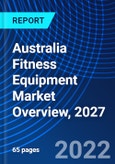This report comes with 10% free customization, enabling you to add data that meets your specific business needs.
1h Free Analyst TimeSpeak directly to the analyst to clarify any post sales queries you may have.
According to the report, Australia Fitness Equipment Market Overview, 2027 the market is anticipated to rise at an exponential growth rate during the forecast period. Key market players operating in the Australia fitness equipment market are coming up with new and innovative outlets and chains of fitness clubs and spas. This is likely to positively impact membership subscriptions, which will ultimately boost the growth of the fitness equipment market over the projected period. Furthermore, escalating incidents of cardiovascular diseases, diabetes, and osteoarthritis are a major concern across the country. According to the World Health Organization, cardiovascular disease is one of the major causes of death. However, many organizations are promoting a healthy lifestyle through sports. As a result, an increasing number of individuals are actively engaged in physical activities such as signing up for workout program and packages or just exercising independently. This is driving the growth of the fitness equipment market.
Moreover, the expanding virtual fitness market will spur the demand for high-quality fitness equipment that can be easily installed at home. Busy working professionals prefer to undertake online fitness sessions to enjoy exercising in the comfort of their homes and as per their convenience. In response to the growing home fitness equipment industry, market players are launching digitally connected solutions for consumers. Consumers are leveraging the benefits of digitally connected fitness equipment to enjoy a personalized training experience through online workout classes across the country. Equipment makers are also investing in research and development (R&D) operations in order to provide sophisticated and user-friendly gadgets that will improve the entire customer experience. Other factors, such as growing consumer spending power and the development of wearable gadgets that can be synced with exercise equipment, are expected to propel the market even further.
According to the report, the Australia fitness equipment market is majorly segmented into two types, including cardiovascular and strength. Among these types, cardiovascular fitness equipment led the market in 2021 and is expected to continue growing during the forecast period. Further, based on cardiovascular equipment type, the market is sub-segmented into cross-country ski machines, elliptical trainers, rowing machines, stair-steppers, stationary bicycles, treadmills, and others. Among these types, treadmills are anticipated to dominate the market by 2027, followed by stationary bicycles, owing to higher adoption across the country. Based on strength type, the market is categorized into hydraulic equipment, weight plates, dumbbells, resistance bands and tubes, and others. Among these types, dumbbells and weight plates occupied major market share in 2021. On the basis of end-user, the market is segmented into commercial and residential end-users. Among these types, the commercial segment is anticipated to acquire a higher market share during the forecast period.
COVID-19 Impacts:
Self-care is becoming a vital part of people health amid COVID-19, including mental, physical, and emotional health. The pandemic has triggered health awareness among the public to boost their immune systems and physical fitness. The imposition of lockdown across the country has resulted in gym closures, enforcing the shift of gym goers toward home fitness equipment from the year 2020. However, increased awareness regarding health and fitness is expected to significantly drive the home fitness equipment market growth. The overall fitness equipment market size has witnessed a dip in the same year.Considered in the report
- Geography: Australia
- Base year: 2021
- Historical year: 2016
- Estimated year: 2022
- Forecasted year: 2027
Aspects covered in the report
- Australia fitness equipment market overview
- Australia cardiovascular fitness equipment market overview
- Australia strength fitness equipment market overview
- Policy & regulations
- Porters five force model
- Company profile of top players
- Strategic recommendation
Segments covered in the market
- By Type
- Cardiovascular
- Strength
By Cardiovascular fitness equipment
- Treadmill
- Stationary bike
- Elliptical trainer
- Rowing machine
- Cross Country ski
- Stair stepper
By Strength fitness equipment
- Dumbbells
- Weight plates
- Hydraulic equipment
- Resistance band & tubes
By End-User
- Commercial
- Residential








